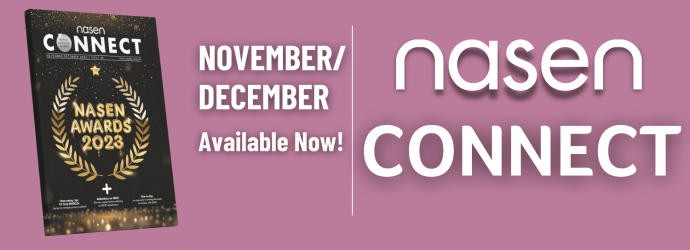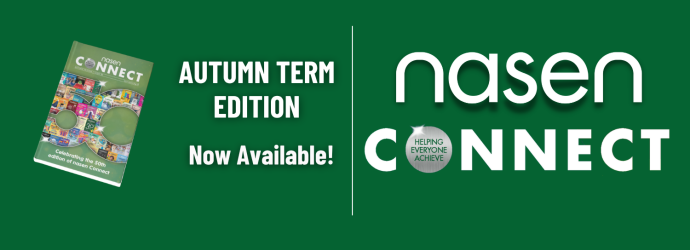
Autism lived experience (Article taken from nasen Connect November/December 2023)
- Nasen Connect
- 03 Nov 2023
Joe Fautley, an advocate for autism and neurodiversity at the National Children’s Bureau, speaks about his personal experiences and shares tips for making education more accessible and comfortable for students with autism.
It’s essential for everyone in society to understand that people with autism face many extensive challenges because the social world is not designed for us. We are not broken, we are unique. We have many important strengths and great potential to succeed through our own personal talents with the right support from people who take the time to listen and understand our own individual needs.
For me and many others with autism, the world we live in is often unpredictable and confusing. We find it difficult to process information at a fast pace. Although everyone on the autism spectrum is unique and has varying levels of support needs, we all face many challenges. These include challenges communicating and interacting with others, managing sensory processing and fatigue, coping with often extreme anxiety and adapting to changes in routine and unfamiliar environments.
It’s helpful to view the autistic spectrum through four key areas of difference: understanding and using language, thinking flexibly, understanding / getting on with others and sensory processing. To a greater or lesser extent, we are all impacted by these key areas, and it is vital that staff have the tools to ensure students with autism are supported throughout their education. Here is my advice:
DON’T UNDERESTIMATE ANXIETY
Anxiety is a powerful emotion and should never be underestimated. Personally, I encounter anxiety on a daily basis and this impacts on my everyday life. People with autism are more likely to experience higher levels of anxiety daily as they must navigate a complicated and often confusing sensory and social world.
Anxiety can be triggered by a variety of factors which include difficulties with communication and social interactions and finding it hard to predict or adapt to certain sensory situations. For me, extreme anxiety often leads to what I call ‘zoning out’. This is my brain’s coping mechanism for dealing with stress, which makes me switch off from what is happening around me. It’s important for students with autism to have access to a dedicated quiet space where they can de-stress.
Having a ‘time out card’ to alert staff that they need to have some time out of the room when their anxiety increases is a useful idea. Not all people with autism may be able to speak or articulate how they are feeling when their anxiety becomes too high. It’s important to make the most of visual tools such as alert cards to describe different emotions.
GIVE TIME TO PROCESS INFORMATION
People with autism have difficulties with interpreting both verbal and non-verbal language like gestures or tone of voice. We also have difficulty ‘reading’ other people - recognising or understanding others’ feelings and intentions - and expressing our own emotions. It’s essential that you give plenty of time for students with autism to process information. We find it difficult to filter out all that is being said to us. Too much information can lead to ‘sensory overload’. It’s important to be aware of the sensory environment when you are speaking to your students as sensory differences may be affecting how much someone can process. For example, is it too crowded? Is there lots of background noise? When giving information to students, it helps to speak slowly, not ask too many questions at once and pause between words and phrases to give them time to process what you’ve said, and to give them a chance to think of a response.
No one person is the same, so it’s important to take time to listen and find out what reasonable adjustments they might need. Understanding what works best for your students as individuals is essential.
DON’T FORGET AUTISTIC FATIGUE
Fatigue, and then subsequent burnout, can happen to anybody. People with autism, however, can find both more challenging. This is due to the pressures of everyday life, having to navigate social situations and sensory overload. Trying to cope with these pressures can lead to exhaustion (autistic fatigue) and, over time, this can lead to autistic burnout. For me personally, managing fatigue can be a difficult process especially when I have had a stressful day. Extreme fatigue can be caused by a variety of factors including sensory overload and dealing with social situations. To support your students, it really helps to allow time for rest breaks and encourage different ways for them to de-stress including, for example, mindfulness and breathing exercises. Ensuring time for activities or interests that re-energise and promote relaxation is key. You can help them to plan and balance their activities and energy over a day or week to try and manage stress limits.
AVOID MAKING ASSUMPTIONS
A student with autism who is academically successful may still have significant needs impacting on their daily life. No one person is the same, so it’s important to take time to listen and find out what reasonable adjustments they might need. Understanding what works best for your students as individuals is essential. For example, an adjustment could be to enable the student to leave the room slightly earlier so they can avoid the crowds. Small changes to your environment can make a big difference!
BIO
JOE FAUTLEY
Joe is an autistic and neurodiverse advocate who works at the National Children’s Bureau. He has many years of experience in SEND advocacy work, including co-delivering training across England and presenting at conferences. For more information, watch this short YouTube video from the NHS in which Joe talks openly about his personal experiences: https://bit.ly/46kiMrD.
Note from the editor: This article uses person-first language throughout. It is very much a personal preference to use identity-first or person-first and we will use both throughout our publication as given by our contributors.
The next issue of nasen Connect will be available shortly!
Catch-up with nasen Connect

nasen Connect magazine Autumn Term edition 2025
- Nasen Connect
- 04 Nov 2025
Celebrating 50 editions of nasen Connect – and a heartfelt thank you

nasen Connect magazine Feature edition 2025
- Nasen Connect
- 02 Jul 2025
This occupational therapy and sensory support feature edition is packed full of articles to inform, inspire and embed excellent practice throughout your setting.

nasen Connect magazine Summer Term edition 2025
- Nasen Connect
- 01 May 2025
In this edition, we explore why a focus on spoken language is essential to literacy and learning, how schools can address maths anxiety early, and what to do when the language within EHC Plans don’t deliver.







